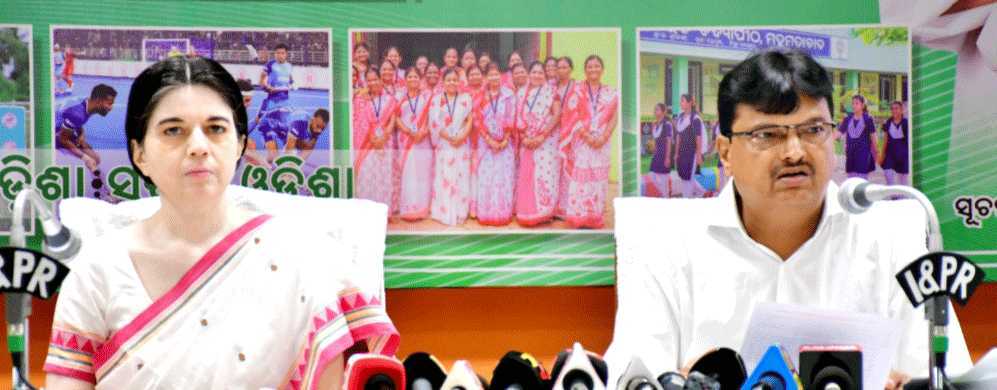Bhubaneswar: The path-breaking State-sponsored health assurance scheme, Biju Swasthya Kalyan Yojana (BSKY) has saved healthcare expenses over Rs 2700 crore of 13 lakh poor families.
This was known from a high-level meeting taken by Chief Minister Naveen Patnaik to review the schemes and programs undertaken by the Health & Family Welfare Department.
Niranjan Pujari, Minister Health & Family Welfare and Shalini Pandit, Secretary Health & Family Welfare briefed Media here about the developments in Health Sector.
Odisha is the first and only State in the country and perhaps the world, where all healthcare services, from OPD consultation to ICU and surgery, are provided free of charge to all persons, in all Government hospitals, said Health Minister Niranjan Pujari.
Till now, 96.5 lakh families covering over 3.3 crore people have been covered with cashless healthcare in nearly 700 premier private hospitals across 17 States. Each month nearly 1 lakh patients receive cashless healthcare of Rs 225 crores in private empanelled hospitals across the country.
Each year, poor families save Rs 600 crore expenditure on drugs, which is borne under Niramaya. Similarly, the people of Odisha save over Rs. 150 crores each year on diagnostic expenses alone under the Nidaan scheme, he said.
In addition to this, 96.5 lakh families covering over 3.3 crore people of Odisha are provided with cashless healthcare in nearly 700 premier private hospitals across 17 States. The cashless coverage is up to Rs 5 lakh per annum for a family and Rs 10 lakh per annum for women members of the family, Shri Pujari said.
Presently, he said, every year, about 60,000 patients receive care of above Rs. 1 lakh per annum, nearly 25,000 patients receive care of above Rs. 2 lakh per annum, about 1,300 women patients receive care of above Rs. 5 lakh per annum, and over 100 women patients receive care of Rs. 10 lakh per annum.
Pujari said that BSKY runs on a fully online, paperless platform. BSKY Smart Health Cards have been provided to all eligible families.
He said eight new medical colleges and two new post graduate institutes have been set up in the last six years in the State. New Medical Colleges and Hospitals have been set up at Koraput, Baripada, Balasore, Bolangir, Puri, Keonjhar, Sundergarh and Kalahandi.
Post graduate institutions established at Cuttack and Capital Hospital, Bhubaneswar. While Odisha was producing only 321 MBBS doctors and 254 specialists per year in the year 2000, now 2200 MBBS doctors and 826 specialists are being produced in the State each year, he pointed out.
In 2021, the Chief Minister took a landmark decision to reserve 15 percent of MBBS seats for students of Government High Schools. It is a matter of pride for us that in the past 2 years, 415 students of Government High Schools have been admitted in MBBS courses, under this policy.
Moreover, for transforming the SCB Medical College& Hospital into an AIIMS Plus category hospital, the State has allocated over Rs. 4500 crore, the Minister said.
To provide quality treatment to cancer patients, Bagchi Sri Shankara Cancer Hospital with 750 beds and all modern amenities is being established in Bhubaneswar, which will become functional this year.
Another 200 bedded state of the art cancer hospital is in the process of being set up by Tata Memorial Centre in collaboration with State Government and Department of Atomic Energy in the NISER campus, for which the State is providing 67 acres of land along with Rs. 150 crores for a State-of the-art cyclotron, which will be the first in the State and the most advanced in South Asia.
Further, a 100 bedded Bagchi-Karunashraya Palliative Care Centre is under construction in Bhubaneswar at a cost of Rs. 110 crore.
Under 5T initiatives, the online issue of birth and death certificates has been implemented since January 2021. In addition, registration of Clinical Establishments and issue of NOC for paramedical institutions had been made online since 2019.
In the past four years, 112 new ambulances have been added to the 108 Ambulance fleet and 327 ambulances have been upgraded to advanced life saving (ALS). With this, each Block in the State has an ALS ambulance.
The 108 Ambulance Service now runs a fleet of 1124 vehicles, which carry over 4000 patients daily, providing emergency medical service free of cost to the people.
It is proposed to add another 236 ambulances to the fleet by December 2023, which will reduce the average response time from 30 minutes to 20 minutes.


